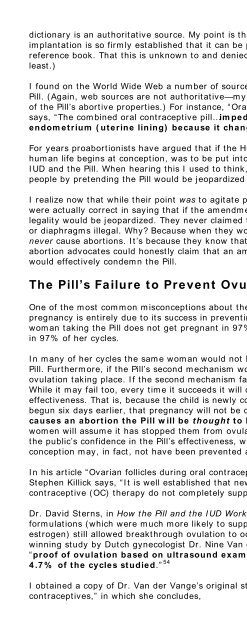Does the Birth Control Pill Cause Abortions
Does the Birth Control Pill Cause Abortions
Does the Birth Control Pill Cause Abortions
Create successful ePaper yourself
Turn your PDF publications into a flip-book with our unique Google optimized e-Paper software.
dictionary is an authoritative source. My point is that <strong>the</strong> knowledge of <strong>the</strong> <strong>Pill</strong>’s prevention of<br />
implantation is so firmly established that it can be presented as standard information in a household<br />
reference book. That this is unknown to and denied by so many Christians is remarkable to say <strong>the</strong><br />
least.)<br />
I found on <strong>the</strong> World Wide Web a number of sources that recognize <strong>the</strong> abortive mechanism of <strong>the</strong><br />
<strong>Pill</strong>. (Again, web sources are not authoritative—my point is to demonstrate a widespread awareness<br />
of <strong>the</strong> <strong>Pill</strong>’s abortive properties.) For instance, “Oral Contraceptives: Frequently Asked Questions,”<br />
says, “The combined oral contraceptive pill…impedes implantation of an egg into <strong>the</strong><br />
endometrium (uterine lining) because it changes that lining.” 51<br />
For years proabortionists have argued that if <strong>the</strong> Human Life Amendment, which recognizes each<br />
human life begins at conception, was to be put into law, this would lead to <strong>the</strong> banning of both <strong>the</strong><br />
IUD and <strong>the</strong> <strong>Pill</strong>. When hearing this I used to think, “They’re misrepresenting <strong>the</strong> facts and agitating<br />
people by pretending <strong>the</strong> <strong>Pill</strong> would be jeopardized by <strong>the</strong> HLA.”<br />
I realize now that while <strong>the</strong>ir point was to agitate people against <strong>the</strong> Human Life Amendment, <strong>the</strong>y<br />
were actually correct in saying that if <strong>the</strong> amendment was passed and taken seriously, <strong>the</strong> <strong>Pill</strong>’s<br />
legality would be jeopardized. They never claimed <strong>the</strong> Human Life Amendment would make condoms<br />
or diaphragms illegal. Why Because when <strong>the</strong>y work, those methods are 100% contraceptives—<strong>the</strong>y<br />
never cause abortions. It’s because <strong>the</strong>y know that <strong>the</strong> <strong>Pill</strong> sometimes prevents implantation that<br />
abortion advocates could honestly claim that an amendment stating human life begins at conception<br />
would effectively condemn <strong>the</strong> <strong>Pill</strong>.<br />
The <strong>Pill</strong>’s Failure to Prevent Ovulation<br />
One of <strong>the</strong> most common misconceptions about <strong>the</strong> <strong>Pill</strong> is that its success in preventing discernible<br />
pregnancy is entirely due to its success in preventing ovulation. In fact, if a sexually active and fertile<br />
woman taking <strong>the</strong> <strong>Pill</strong> does not get pregnant in 97% of her cycles it does not mean she didn’t ovulate<br />
in 97% of her cycles.<br />
In many of her cycles <strong>the</strong> same woman would not have gotten pregnant even if she weren’t using <strong>the</strong><br />
<strong>Pill</strong>. Fur<strong>the</strong>rmore, if <strong>the</strong> <strong>Pill</strong>’s second mechanism works, conception will be prevented despite<br />
ovulation taking place. If <strong>the</strong> second mechanism fails, <strong>the</strong>n <strong>the</strong> third mechanism comes into play.<br />
While it may fail too, every time it succeeds it will contribute to <strong>the</strong> <strong>Pill</strong>’s perceived contraceptive<br />
effectiveness. That is, because <strong>the</strong> child is newly conceived and tiny, and <strong>the</strong> pregnancy has just<br />
begun six days earlier, that pregnancy will not be discernible to <strong>the</strong> woman. Therefore every time it<br />
causes an abortion <strong>the</strong> <strong>Pill</strong> will be thought to have succeeded as a contraceptive. Most<br />
women will assume it has stopped <strong>the</strong>m from ovulating even when it hasn’t. This illusion reinforces<br />
<strong>the</strong> public’s confidence in <strong>the</strong> <strong>Pill</strong>’s effectiveness, with no understanding that both ovulation and<br />
conception may, in fact, not have been prevented at all.<br />
In his article “Ovarian follicles during oral contraceptive cycles: <strong>the</strong>ir potential for ovulation,” Dr.<br />
Stephen Killick says, “It is well established that newer, lower-dose regimes of combined oral<br />
contraceptive (OC) <strong>the</strong>rapy do not completely suppress pituitary and ovarian function.” 52<br />
Dr. David Sterns, in How <strong>the</strong> <strong>Pill</strong> and <strong>the</strong> IUD Work: Gambling with Life, states, “even <strong>the</strong> early pill<br />
formulations (which were much more likely to suppress ovulation due to <strong>the</strong>ir higher doses of<br />
estrogen) still allowed breakthrough ovulation to occur 1 to 3% of <strong>the</strong> time.” 53 He cites an award<br />
winning study by Dutch gynecologist Dr. Nine Van der Vange in which she discovered in <strong>Pill</strong>-takers<br />
“proof of ovulation based on ultrasound exams and hormonal indicators occurred in about<br />
4.7% of <strong>the</strong> cycles studied.” 54<br />
I obtained a copy of Dr. Van der Vange’s original study, called “Ovarian activity during low dose oral<br />
contraceptives,” in which she concludes,



